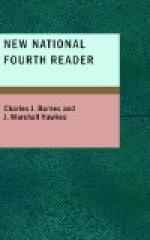* * * * *
Directions for Reading.—This lesson should be read in a spirited manner.
It is suggested to vary the reading exercise by having one pupil read each stanza, and the class repeat it in concert.
* * * * *
Language Lesson.—Let pupils use other words to express the meaning of what is given below in dark type.
There are few can match me.
They’d go out of their way to keep clear of the Brier.
Supply letters omitted from the following words: they’d, gown’s, e’en, ’round. Write the words in full.
* * * * *
LESSON XXV.
ply, make regular journeys.
com’merce, trade between places or peoples.
might’y, of great power.
trav’erse, pass over; cross.
re’al ize, understand the truth of.
pro pel’, drive forward.
prop’erty, any thing that belongs to a person.
or’chards, numbers of fruit-trees.
im mense’, very large.
glit’ter ing, sparkling with light.
* * * * *
WATER.
It is difficult to realize that nearly three-fourths of the surface of the earth is water; yet it is a fact.
Think of the immense space covered by oceans, seas, lakes, and rivers, and how useful all this water is to mankind.
Sailing ships and steam-ships traverse the oceans and lakes. Steam-boats ply along the rivers, carrying people and merchandise to and fro, going sometimes as far as three thousand miles from their starting point.
It is by water that men float their rafts of logs or lumber to distant places. Water turns the great wheels of many of our mills, and thus harnessed to mighty machines, does more work than thousands of men and horses.
These machines produce paper, cloth, flour, lumber, and many other useful articles.
When water is heated and turned into steam, it moves powerful engines. These engines propel our great steam-ships and steam-boats and drive machines of all kinds in mills and factories.
Many of you have seen water, clear and cool, trickling from the rocks in the side of a hill. This water first forms a spring.
From this spring, the water escapes in a tiny stream, called a rivulet or creek, and flows along until it enters a river. Many springs make many rivulets; many rivulets make large rivers.
Rivers sometimes receive such great quantities of water that they overflow their banks, and destroy much valuable property. This is called a freshet or a flood.
Many people who live near some of our rivers have lost their houses, furniture, and cattle, which were all swept away by these floods.




